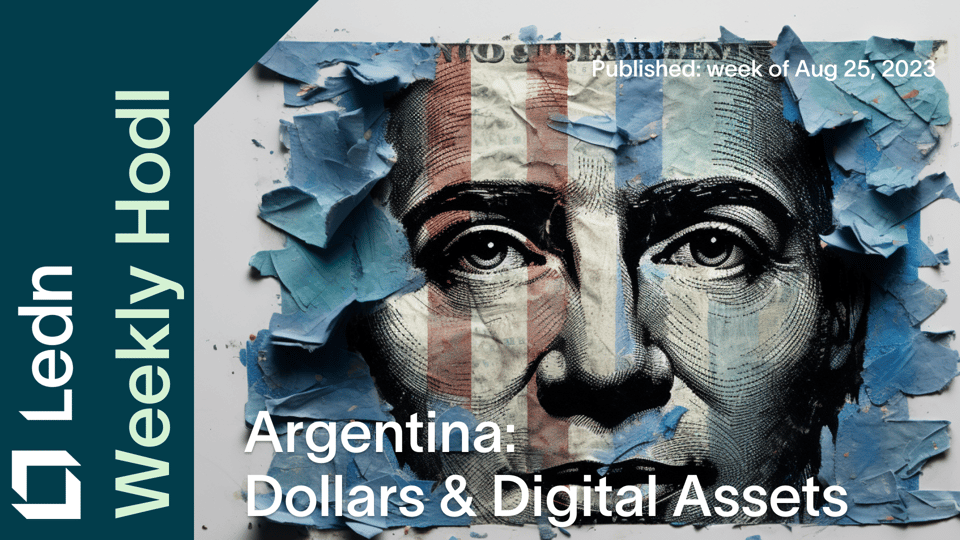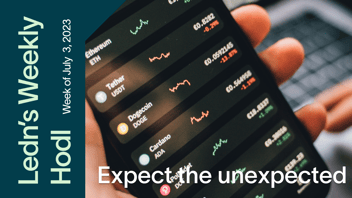Weekly Hodl: Argentina: Dollars & Digital Assets

Ledn’s Weekly Hodl: Argentina: Dollars & Digital Assets
Week of Monday August 21st
Start earning up to 9% APY on your crypto with a Ledn Growth Account.
Bitcoin Market Analysis
Bitcoin closed down -10.59% last week, delivering a “big red candle” the likes of which we hadn’t seen since April of this year.
The move came on relatively thin volume, very similar to the volume traded on the week after the Blackrock spot Bitcoin ETF announcement.
Bitcoin had been defying gravity over the preceding 3 weeks, with the S&P, Nasdaq, and even gold dropping significantly while Bitcoin held steady at $30K. Based on the price action, the severity of the move was magnified by the fact that spot market liquidity was very thin, and there was a lot of leverage built up on the back of the Blackrock ETF announcement.
In terms of near-term catalysts for the space, it’s rumoured that the SEC could be approving an Ethereum futures-based ETF, and the same could potentially be going live in October of this year. This would undoubtedly be a catalyst for digital assets in general. In addition, a stablecoin bill has been making its way through the U.S. congress, and we may get updates in the coming weeks or months.
Our Weekly Essay: Argentina: Dollars & Digital Assets
This coming October 22nd, Argentina will head to the polls to elect a new president. Candidate Javier Milei has been in the spotlight since August 13th, when shocked the world by winning the primary elections as an outsider with a libertarian platform.
Mr. Milei’s victory has come as a surprise to many, as Argentina is a country that has historically supported socialist governments with strong participation in its economy and actively subsidizing parts of the same. Therefore picking a president that’s running on a platform of slashing government spending, closing ministries, dollarizing the economy and shutting down the central bank felt like too much of a stretch for international observers.
However, this view misses the fact that people in Argentina long ago stopped feeling like government subsidies are working to their benefit. Most often, these bloated incentive programs end up riddled with corruption, making the contractor and few people up and down the supply chain very rich – with the subsidy itself rarely making it to the people. It’s the same playbook that we saw in Venezuela.
Argentina owes more money to the International Monetary Fund than any other country. Its IMF debt stands at ~$44 Billion, nearly ⅓ of all IMF loans outstanding. Meanwhile, the Central Bank’s net reserves have fallen to their lowest levels in history, at $6.45 Billion as of July 2023. The nation’s economy is in poor shape, and so are its people. 39.2% of Argentina’s population lives in poverty.
Argentinians have been ravaged by hyperinflation in recent years, and have found solutions in U.S. dollars, bitcoin, stablecoins and digital assets. In addition to his proposal to end the Argentine Central Bank and dollarize the economy, Milei is also an open supporter of bitcoin, and of deregulating the digital asset ecosystem so that service providers can compete and thrive.
In short, Argentines have found solutions in U.S. dollars, bitcoin and stablecoins over the recent years. They have NOT found solutions in their corrupt government’s subsidy programs. Therefore it should come as no surprise that many are voting for someone who represents the solutions that have worked.
Consensual Dollarization & its effects
Milei is not the first LatAm leader that welcomes dollarization. Panama dollarized its economy in 1904, Ecuador and El Salvador did so in 2000 and 2001, respectively.
So - how have their economies, and most importantly – their people, fared since? To assess, we’re going to examine the countries’ inflation rate, gross domestic product, and wealth inequality, before and after dollarization.
Ecuador:
The charts below speak for themselves. Since Ecuador’s economy became dollarized in 2000, inflation has plummeted, gross domestic product has surged, and income inequality has been greatly reduced.
1) Inflation:3. Wealth Inequality:
El Salvador:
The results were eerily similar in El Salvador, with the only difference being that inflation started coming down in the ‘90s ahead of the official dollarization of the country in the year 2001.
1. Inflation rate:
2. Gross Domestic Product:
3. Income Inequality:
It’s very hard to object with the data above. Dollarization seems to have materially improved the economies and quality of life of people in Ecuador and El Salvador.
Non-consensual Dollarization & its effects
On the other hand, there are countries that face the same problems: a complete loss of faith in the currency, yet, they refuse to let go. They continue forcing its people to use a worthless currency so that they can continue printing their own money and spending it at their leisure. While the economies are de facto dollarized, as in - everyone uses dollars every day, for all types of payments and transactions - it’s not recognized as local legal tender. In these examples, inflation is still measured in the “local” currency - which, while limited in use, still sets the “official” inflation rate.
Venezuela
1. Inflation rateAccording to Venezuelan Central Bank data (which, I may add, grossly understates inflation), after reaching a peak in 2015-2016, inflation in Venezuela is “just” ~49% for 2023.
The GDP bubble in Venezuela is entirely a product of oil price surge. Notice how Venezuela was not able to sustain an upward trajectory. A big reason is the fact that Venezuela’s oil production capacity has been decimated under the authoritarian regime. So, even though oil prices are about 4X higher now than in the 90’s, Venezuela’s production has dropped by roughly the same amount - from 3.5 million barrels per day, to now under 1 million barrels per day.
Venezuela is so bad, it stopped sharing inequality data to the World Bank.
Nicaragua
1. InflationSurprisingly, according to the Nicaraguan Central Bank, inflation in Nicaragua has been contained to the low double digits (~10%) in recent years.
2. Gross domestic product
We also see that Nicaragua has managed to maintain healthy growth in gross domestic product terms, regardless of having kept its own currency.
3. Income InequalitySimilar to Venezuela, Nicaragua has very poor reporting when it comes to income inequality. However, from the available data and global trends, we can infer that they would have higher inequality now vs. 2014. Therefore, we can see that income inequality is the worst-performing metric for Nicaragua.
Objectively speaking, the countries that have embraced dollarization have seen lower inflation, higher economic growth, and substantially reduced income inequality. It’s no surprise that Milei and his advisors are championing the model for Argentina.
The fight against dollarization
There are, of course, downsides to dollarization. The main one being that the country cannot set its own monetary policy. That is, it loses the ability to “print cash” to stimulate its economy, and it loses its ability to set interest rates for the same purpose. This is a great loss of independence, and there’s a great deal of more scrutiny when you have to finance your government deficits via bond sales that have to be sold to discerning investors, versus printing cash, which you can dump upon unwilling citizens.
Is the world doomed to be dollarized? No - there are many countries that have managed to maintain their currencies relatively stable vs. the dollar, like Brasil, China, Europe, Mexico and a few others. So, it is not a foregone conclusion that everyone will have to end up using the U.S. dollar.
Running the “world’s currency” gives the U.S. a massive privilege. One that other countries are trying to gain back.
Brasil, Russia, India, China, and South Africa (BRICS), have long been touting the idea of a common currency. Additionally, BRICS members have been adamant about expanding the member list to increase their economic clout. And what’s even more interesting, is that they recently invited Argentina to join.
As if the Argentine election wasn’t interesting enough already, Javier Milei has been vocally opposed to Argentina joining the BRICS alliance. He says that he won’t “trade with communists”.
However, the BRICS coalition seems to be gaining traction, with other members being announced recently, including the United Arab Emirates, who ironically have their currency, the Durham, pegged to the U.S. dollar.
Moves are being made in the FIAT currency world. Investors need to be paying attention.
A New Era for Argentina
It’s still way too early to declare Javier Milei a winner. But suffice to say, he holds an orthogonally different view to the incumbents. His platform of dollarization is supported by the Ecuador and El Salvador case studies, and his platform of deregulation of digital assets - which have already helped millions of Argentinians, of course resonates with the people that have already benefited from bitcoin, stablecoins and others.
Argentina needs a radical change. And Milei is a radically different alternative. His leadership would bode well for bitcoin and the digital asset ecosystem in Latin America.
We’ll be watching closely.
HODL.
Notice for Canadian Residents: As of August 3, 2023, any Canadian BTC or USDC Savings Account is transitioned into a new non-interest earning BTC or USDC Transaction Account for the purposes of allowing Canadian clients to manage their Ledn loans.
Notice for U.S. Residents: As of August 3, 2023, any U.S. BTC or USDC Savings Account is transitioned into a new non-interest earning BTC or USDC Transaction Account. On that date, the account balance in any U.S. Legacy Savings Accounts will remain in such accounts and continue to be non-interest earning.
This article is intended for general information, educational and discussion purposes only, it is not an offer, inducement or solicitation of any kind, and is not to be relied upon as constituting legal, financial, investment, tax or other professional advice. This article is not directed to, and the information contained herein is not intended for distribution to, or use by, any person or entity in any jurisdiction or country where such distribution, publication, availability or use would be contrary to law or regulation or prohibited by any reason whatsoever or that would subject Ledn and/or its affiliates to any registration or licensing requirement. This article is expressly not for distribution or dissemination in, and no Ledn product or service is being marketed or offered to residents of, the European Union, the United Kingdom, the United States of America or any jurisdiction in Canada, and such product or service may only be marketed or offered in such jurisdictions pursuant to applicable laws or reliance on regulatory exemptions. A professional advisor should be consulted regarding your specific situation. Digital assets are highly volatile and risky, are not legal tender, and are not backed by the government. The information contained in this publication has been obtained from sources that we believe to be reliable, however we do not represent or warrant that such information is accurate or complete. Past performance and forecasts are not a reliable indicator of future performance. Any opinions or estimates expressed herein are subject to change without notice. This article may contain views or opinions of the author that do not necessarily reflect the opinions, standards or policies of Ledn. We expressly disclaim all liability and all warranties of accuracy, completeness, merchantability or fitness for a particular purpose with respect to this article/communication. Read our Disclaimers at https://ledn.io/legal/disclaimers



